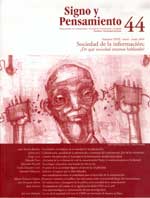Abstract
La trillada brecha digital se ha convertido en un lugar común en nuestra jerga sobre comunicación y desarrollo. Sin duda, es clara entre los países del Norte y del Sur, pero aún más dramáticamente explícita en el interior de los países del Tercer Mundo, entre las áreas urbanas y rurales y entre ricos y pobres. Ya no es posible aislar el tema y reducir el desequilibrio a una cuestión de acceso a la tecnología; sin embargo, esto es precisamente lo que sucede tantas veces, cuando las TIC se perciben como la 'solución' para la pobreza y el subdesarrollo, como si la injusticia social, la discriminación, la corrupción, los injustos acuerdos comerciales, la carencia de servicios básicos, los precarios sistemas de educación y salud, etc. fueran únicamente factores marginales. Las TIC irrumpieron en el mundo del desarrollo con mucha fuerza; en los años ochenta y noventa se dio un impluso muy grande paa 'brindar acceso' a las nuevas tecnologías de la información en áreas pobres del mundo. Sin embargo, la realidad muestra que sembrar computadores y conectividad en comunidades que no tienen siquiera agua potable y electricidad y menos aún líneas telefónicas, es casi siempre un fracaso anunciado, debido a la falta de participación de las comunidades afectadas.This journal is registered under a Creative Commons Attribution 4.0 International Public License. Thus, this work may be reproduced, distributed, and publicly shared in digital format, as long as the names of the authors and Pontificia Universidad Javeriana are acknowledged. Others are allowed to quote, adapt, transform, auto-archive, republish, and create based on this material, for any purpose (even commercial ones), provided the authorship is duly acknowledged, a link to the original work is provided, and it is specified if changes have been made. Pontificia Universidad Javeriana does not hold the rights of published works and the authors are solely responsible for the contents of their works; they keep the moral, intellectual, privacy, and publicity rights.
Approving the intervention of the work (review, copy-editing, translation, layout) and the following outreach, are granted through an use license and not through an assignment of rights. This means the journal and Pontificia Universidad Javeriana cannot be held responsible for any ethical malpractice by the authors. As a consequence of the protection granted by the use license, the journal is not required to publish recantations or modify information already published, unless the errata stems from the editorial management process. Publishing contents in this journal does not generate royalties for contributors.


